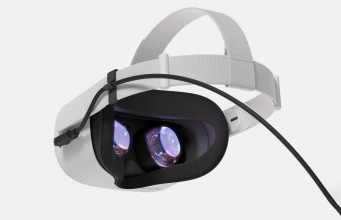
Oculus Link and Oculus Air Link allows you use your Quest or Quest 2 to play PC VR games. Here’s a breakdown of the Oculus Link and Air Link recommended hardware specs and what you’ll need to use Quest and Quest 2 to play Rift and SteamVR games on your PC.
Updated – May 5th, 2021
Oculus Quest & Quest 2 Recommended PC Specs (Oculus Link & Air Link)
You’ll need a reasonably powerful PC to play Rift and Steam games on Quest via Oculus Link & Air Link, though many modern gaming PCs with NVIDIA or AMD graphics cards will fit the bill. Here’s the PC hardware you’ll need for Quest and Quest 2 to work on PC.
Oculus Link & Air Link Compatible Graphics Cards
| GPU | Supported |
Not Currently Supported
|
| NVIDIA Titan Z |  |
|
| NVIDIA Titan X |  |
|
| NVIDIA GeForce GTX 970 |  |
|
| NVIDIA GeForce GTX 1060 (desktop, 3GB) |  |
|
| NVIDIA GeForce GTX 1060 (desktop, 6GB) |  |
|
| NVIDIA GeForce GTX 1060M |  |
|
| NVIDIA GeForce GTX 1070 (all) |  |
|
| NVIDIA GeForce GTX 1080 (all) |  |
|
| NVIDIA GeForce GTX 1650 |  |
|
| NVIDIA GeForce GTX 1650 Super |  |
|
| NVIDIA GeForce GTX 1660 |  |
|
| NVIDIA GeForce GTX 1660 TI |  |
|
| NVIDIA GeForce RTX 20-series (all) |  |
|
| NVIDIA GeForce RTX 30-series (all) |  |
|
| AMD 200 Series |  |
|
| AMD 300 Series |  |
|
| AMD 400 Series |  |
|
| AMD 500 Series |  |
|
| AMD 5000 Series |  |
|
| AMD 6000 Series |  |
|
| AMD Vega Series |  |
Oculus Link & Air Link CPU, RAM, USB, and Operating System Requirements
|
Recommended Specs
|
|
| Processor |
Intel i5-4590 / AMD Ryzen 5 1500X or greater
|
| Memory | 8 GB+ RAM |
| Operating System | Windows 10 |
| USB Ports | 1x USB port (unless using Air Link) |
Oculus Link vs. Air Link
What’s the difference between Oculus Link and Oculus Air Link? Oculus Link uses a cable to connect your headset directly to your PC. This will generally result in the best visual performance, and in most cases it will let your headset’s battery last significantly longer than if you use Air Link.
Oculus Air Link is the same feature as Oculus Link, except wireless. If you have an ideal network configuration, Air Link can be a great way to easily play PC games wirelessly with Quest. Without an ideal network configuration, you might have issues with Air Link (like lag or low quality visuals).
Tethered: Oculus Link Cable
Oculus Link technically works with any USB cable, including the one that comes in the box with Quest, but without a fairly long cable you won’t have much room to move around. If you’re only planning to play seated games like racing or flying sims, you can probably get by with the included cable, otherwise you’ll want to buy a dedicated cable that’s long enough that you can really spread your virtual wings.
An inexpensive option is to combine this Anker 10ft USB 3.0 cable with this CableCreation 16ft USB 3.0 extender for a total of 26 feet for just $37 from Amazon.
Alternatively, Oculus sells a lighter (but much more expensive) 16ft USB 3.0 Oculus Link cable for $80, also available on Amazon.
Whether you pick a third-party USB 3.0 cable or Oculus’ own cable, both will give you the same visual experience when used with Oculus Link. You can even get by with a USB 2.0 cable in a pinch.
Wireless: Oculus Air Link Network Recommendations
You’ll need a properly configured network for Oculus Air Link to work reliably. Here’s what to do to ensure the best performance:
- PC connected to router/access-point via Ethernet cable
- Router supporting Wi-Fi AC or AX (also called Wi-Fi 5 / 802.11AC or Wi-Fi 6 / 802.11AX)
- Headset connected to 5GHz Wi-Fi band
- Router in the same room as the headset or in line-of-sight, and at least 1m off the ground
- Don’t use a mesh network configuration (extenders, etc)
Oculus Air Link is still in beta: see our full guide about how to activate the feature.
The post How to Tell if Your PC is Ready for Oculus Link & Air Link appeared first on Road to VR.
from Road to VR https://ift.tt/2rP0DnB
via IFTTT
No comments:
Post a Comment